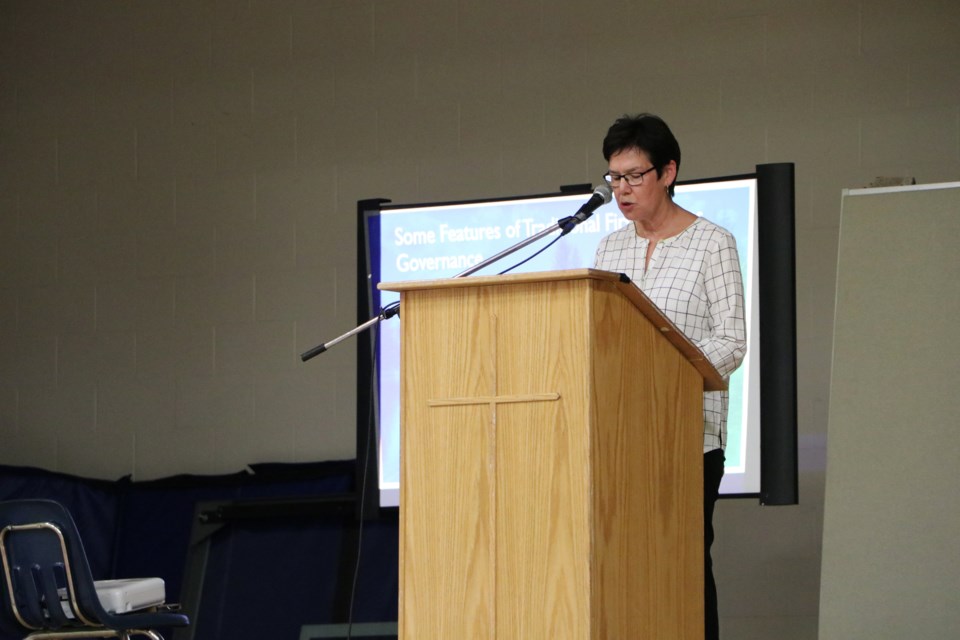STONEY NAKODA – Îethka (Stoney Nakoda) elders, knowledge keepers and professionals spoke at an event on the impact of colonization on Indigenous communities.
The session, called Understanding the Impact of Colonization, was an opportunity for Îethka people and those working for them or in their communities, to understand the position they occupy in First Nations spaces. With roughly 50 people attending Tuesday (Oct. 4) at the Morley Gymnasium – most of whom were non-Indigenous – speakers focused on the relationship Indigenous people have with non-Indigenous.
“We have a situation in Morley where [Stoney Tribal] Administration [staff] are predominantly non-Indigenous,” said Trent Fox, who organized the event as part of a four-part series sponsored by the United Church Healing Fund. “To me, that tells our youth that we are dependent on the non-Indigenous.”
Fox made a point of inviting speakers from the community who have pursued an education and career in professional fields. Speakers at the event included Terry Poucette, team lead for the City of Calgary’s Indigenous relations office; community elder Tina Fox; Nakoda Elementary School principal Aimee Cutknife, and educator Georgina Twoyoungmen; all of whom are from Îyârhe (Stoney) Nakoda First Nation.
Reverend John Snow Jr. was the keynote speaker for the second day of the event, focusing on the United Church’s role in residential schools, truth and reconciliation. Joining him was Angela Young, who spoke about the history of child welfare and Indigenous children, as well as Snow, who gave a presentation on the impacts of colonization on Indigenous health.
Topics included the Indian Act and its impact on Indigenous communities, residential schools and generational trauma and the history of Indigenous education in Canada.
“These people have all achieved things in life and can demonstrate to our young people, that they too, can go on to do great things and work,” said Fox.
Master of ceremonies of the two-day event, Thomas Snow, suggested those in attendance reflect on whether they are taking employment opportunities away from those who may be more qualified to work within the community, as community members.
“These seats are predominantly filled by non-Indigenous people that work within the Nation, and that profit and benefit from Nation monies when it should be going to Indigenous people,” said Snow. “That is what I’m really hoping people will take away from this is that they should be making some space and giving up their spots for Stoney Nation members.
“If they can’t see that, then they have a lot of work to do because they’re willfully choosing ignorance.”
Snow is an Îyârhe Nakoda man, knowledge keeper and host of Nakoda Conversational, a show on Windspeaker Radio Network (CJWE).
He said when he looks at Îethka people, he sees brilliance, and he wants his community to know its full potential.
“A really big part of sharing these stories and having these speakers here is to educate and uplift our own people so that we get to hear and recognize each other’s stories and successes, but also to honour the challenges that we have all overcome collectively,” said Snow.
Shalome Hope, Snow’s partner and one of the volunteers with the event, stressed the importance of the non-Indigenous community that works within the Nation to, at the very least, listen actively and closely to elders and knowledge keepers so they can better serve the community.
“You can’t find this knowledge written anywhere,” said Hope. “Nakoda is an oral society.
“I hope that what people recognize is that, unless they have been listening very closely to these voices, they have not prepared themselves adequately to be qualified to work with Indigenous people, with Indigenous children, or within that community.”
At the bare minimum, Hope feels those working in the community should learn the Îethka language.
Hope, of Thunderchild First Nation in Saskatchewan, has been on a journey of learning the language since marrying into the Nation, as is tradition. She’s also helping Fox build an Îethka Dictionary, separate from Stoney Education Authority’s dictionary, which launched last year in a partnership with The Language Conservancy, along with other educational resources.
The dictionary project, Fox said, is another example of the Nation striving for independence from non-Indigenous influences.
“We have the expertise, and we have the ability to overcome and succeed without outside help,” he said. “I hope we can inspire our community to see that.”
The Local Journalism Initiative is funded by the Government of Canada. The position covers Îyârhe (Stoney) Nakoda First Nation and Kananaskis Country.




